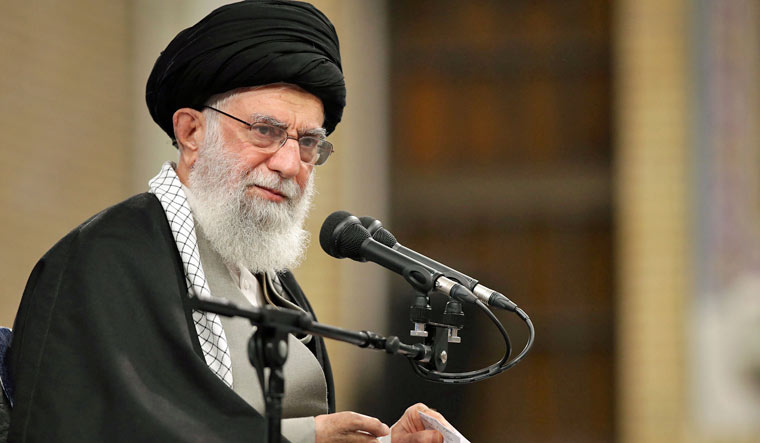On Wednesday, US President Donald Trump made a direct overture of peace to Iran, a day after the latter directed almost a dozen ballistic missiles at a US military base in Iraq. In a direct message to the Iranian leaders and the people, Trump said the United States is "ready to embrace peace with all who seek it". "To the people and leaders of Iran, we want you to have a future and a great future, one that you deserve," Trump said. This was considered a significant move forward in the de-escalation of tensions with the Islamic nation.
ALSO READ
- 'We support Israel’s right to defend itself': Rishi Sunak's UK to China, how the world reacted to Iran's drone strike
- Iran's aerial attack on Israel: 5 major developments as over 200 drones shot down by IDF, US forces
- Iran says nuclear talks with world powers will resume in Vienna in a few weeks
- 'Iranians denied free and fair elections': US says after hardline cleric wins Iran prez polls
- Senior Swiss diplomat dies after fall from high-rise in Iran
- Iranian minister Zarif says former IRGC chief Soleimani interfered in foreign policy
- US to resume indirect talks with Iran in Vienna next week
However, hours after his address, two rockets were once again directed at Iraq's heavily fortified Green Zone, which houses government buildings and foreign missions, including US military bases. Police sources told Reuters at least one of the rockets fell 100 metres (yards) from the US Embassy. "Two Katyusha rockets fall inside the Green Zone without causing casualties," Reuters quoted military sources.
After an unexpected US military strike killed Iran's top general and head of Revolutionary Guards, Qasem Soleimani, the Middle East was in boil. Never before was such a magnitude of escalation. Heated rhetoric followed from both sides. Two days after Soleimani's killing, Iran launched a strike on the US in Iraq: Over a dozen ballistic missiles targeted at least two bases where US military and coalition forces are stationed in Iraq, which Tehran said was a "slap in the face" of America. According to Iranian state TV, the attacks were in revenge for the killing of Soleimani, a strike which was ordered by Trump. The Iranian state television claimed that "at least 80 terrorist US soldiers" were killed in the strikes, a claim which the US rejected. "We suffered no casualties. All of our soldiers are safe and only minimal damage was sustained at our military bases," Trump said in an address to the nation from the White House Grand Foyer. Some 5,000 US soldiers are in Iraq as part of the international coalition against the IS terror group. Things had come to a head.
But, international observers heaved a sigh of relief when both the countries expressed unwillingness to carry this issue forward further. With the strike, Iran said it had carried out and "concluded" its reprisal over the killing of Soleimani. "Iran took and concluded proportionate measures in self-defence" targeting a base from which a "cowardly armed attack against our citizens and senior officials" was launched, said Foreign Minister Mohammad Javad Zarif on Twitter. "We do not seek escalation or war, but will defend ourselves against any aggression." Trump echoed those sentiments in his latest address, when he claimed he would "never allow Iran to have a nuclear weapon", but wished for peace.
At that point of time, de-escalation seemed a good option for both the countries. Iran, with the nominal strike, had managed to save its face domestically—where it is facing the twin blades of populist discontent and the more "extremist factions" trying to hijack the government by painting its inaction as failure. The US played along. The country had succeeded in reestablishing some deterrence towards hostile action from Iran; the killing of Soleimani had redrawn the lines of the conflict and sent shockwaves through Tehran. Soleimani was literally the number 2 in the country after the Ayatollah, and, with his killing, US expected Iran to capitulate and come to the negotiation table sooner than later. There is also the elections in the domestic front for Trump. If they could avoid an all-out war, Trump's team expected a popularity bump. A Reuters/Ipsos poll conducted January 6 and 7 found that 53 per cent of American adults disapproved of Trump's handling of Iran, an increase of about 9 percentage points from a similar poll in mid-December.
Then the fresh missile strike, expected to be done by an Iran proxy group, happened.
What is the way forward next? Will there be a de-escalation? If not an all-out war, will an assymetric war between proxies play out between the two countries? The answer could be found in a recent statement of influential Iraqi Shi'ite cleric Moqtada al-Sadr, who called on militia groups not to carry out attacks on the US. According to Reuters, The populist cleric said in a statement that Iraqis should still seek to expel foreign troops. "I call on the Iraqi factions to be deliberate, patient, and not to start military actions, and to shut down the extremist voices of some rogue elements until all political, parliamentary and international methods have been exhausted," he said.
Iran's next move? Possibly to try and expel US troops from Iraq. Steps are well underway in that direction. A day after Soleimani's killing, Iraq's parliament had voted to expel the US military from the country. Lawmakers voted in favour of a resolution that calls for ending foreign military presence in the country. The resolution's main aim is to get the US to withdraw some 5,000 US troops present in different parts of Iraq. Trump had replied to the resolution with threat of sanctions, fearing a resurgence of the Islamic State if they left the region.


